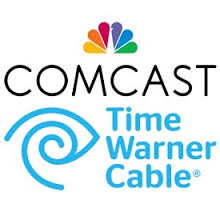Street Lengthens Odds on Comcast-TWC
The smarter way to stay on top of the multichannel video marketplace. Sign up below.
You are now subscribed
Your newsletter sign-up was successful

WASHINGTON — Comcast may yet get to buy Time Warner Cable.
Various Wall Street analysts have lowered the odds that No. 1 U.S. MSO Comcast’s purchase of No. 2 TWC will be consummated, but they’re still arguing that the $69 billion deal has a better-than-even chance of getting past the Justice Department and Federal Communications Commission.
The FCC’s decision to apply phone company-style Title II common-carrier regulations to broadband Internet-service providers could be a plus for the deal, though opponents last week were trying to make sure that decision did not provide any momentum.
Comcast faces a dual vetting challenge. The FCC and Justice Department are looking at the combination’s traditional cable- TV subscribers, though Comcast is spinning off systems to Charter Communications and the newly created GreatLand Connections to keep that tally below 30% of the national pay TV customer count.
As of year-end 2014, Comcast counted some 22.4 million video customers, while Time Warner Cable had 10.8 million pay TV subscribers. After the merger and the system swaps are done, the post-deal Comcast would have just under 30 million subscribers.
FOCUS ON BROADBAND
But likely even more important to an FCC focused on broadband and the power of ISPs over the Internet is the combined company’s share of the high-speed data market.
The smarter way to stay on top of the multichannel video marketplace. Sign up below.
The FCC plans to change its statutory definition of what constitutes advanced telecommunications deployment, in terms of broadband speed, to a minimum of 25 Megabits per second downstream. This could penalize Comcast and Time Warner Cable for providing that high-speed service, as the companies would have a greater share of those subscribers than they did under the prior 4 Mbps benchmark.
But that might be a miscalculation, said Bernstein Research senior analyst Paul de Sa. While reducing the size of the high-speed market would increase the combined company’s share, de Sa said, it also means that Comcast-TWC would control fewer high-speed households.
“Comcast has a higher share of a smaller number of subscribers, reducing anticompetitive concerns,” de Sa said in a note to investors two weeks ago.
“While the FCC recently set a new number as an aspiration for advanced broadband (a number which over 90% of Comcast customers are already receiving), they’ve set different thresholds for different proceedings,” Comcast executive vice president David Cohen told Multichannel News in an email. “The market for broadband is local, not national, and that’s the way the FCC and the DOJ have looked at it in past transactions.
“Even if taken it as a national market, because TWC has so many fewer customers on higher speeds than we do, the percentage increase when the companies combine increases only 1%,” Cohen added.
Analyst Craig Moffett, who had laid the odds at 80-20 in favor of approval as recently as January, was down to 70-30 last month and now has deal approval at 60-40. That was partly due to the FCC’s decision to redefine high-speed Internet service at 25 Mbps, which he called “emblematic of a relatively anti-cable zeitgeist in Washington.”
Wheeler has singled out ISPs as the potential blocking and degrading link in the Internet chain, with the incentive and opportunity to discriminate against both consumers and edge providers.
The FCC could approve the Comcast-TWC deal with conditions that assured that its new Title II regulations would apply to the largest ISP regardless of whether the U.S. Court of Appeals for the D.C. Circuit might throw them out again.
In addition, as part of the proposed Title II regime, FCC chairman Tom Wheeler has proposed creating a new complaint regime for interconnection issues, such as over-the-top video provider Netflix’s longstanding complaint about having to pay for peering.
That regime could make the FCC more comfortable with allowing a Comcast-TWC combination, particularly given the aggressive stance assumed by Enforcement Bureau chief Travis LeBlanc, who would investigate those interconnection complaints.
TITLE II BOOST?
Bernstein’s de Sa said he sees Title II as a slightly net positive for the deal.
“[T]he new rules provide a basic framework for preventing discrimination by broadband providers against internet content,” he told clients. “In principle, therefore, if the rules work, post-merger Comcast will not be able to exploit the market power that opponents of the deal are concerned about.”
Whichever, Comcast’s Cohen suggests he hopes the Title II decision means the FCC can get moving on the deal.
“Now that the FCC has put in place industry wide rules on the Open Internet — which we’ll evaluate when we see the order — we expect they’ll turn to the pending transaction reviews, both ours and AT&TDirecTV,” Cohen said. “We continue to hope for regulatory approvals early this year.”
Not so fast said the Stop Mega Comcast Coalition, which last week circulated a white paper, “Net Neutrality Rules Are No Cure for Mega-Comcast.”
Comcast last month exercised an option to extend the deal’s breakup date to August.
Contributing editor John Eggerton has been an editor and/or writer on media regulation, legislation and policy for over four decades, including covering the FCC, FTC, Congress, the major media trade associations, and the federal courts. In addition to Multichannel News and Broadcasting + Cable, his work has appeared in Radio World, TV Technology, TV Fax, This Week in Consumer Electronics, Variety and the Encyclopedia Britannica.

